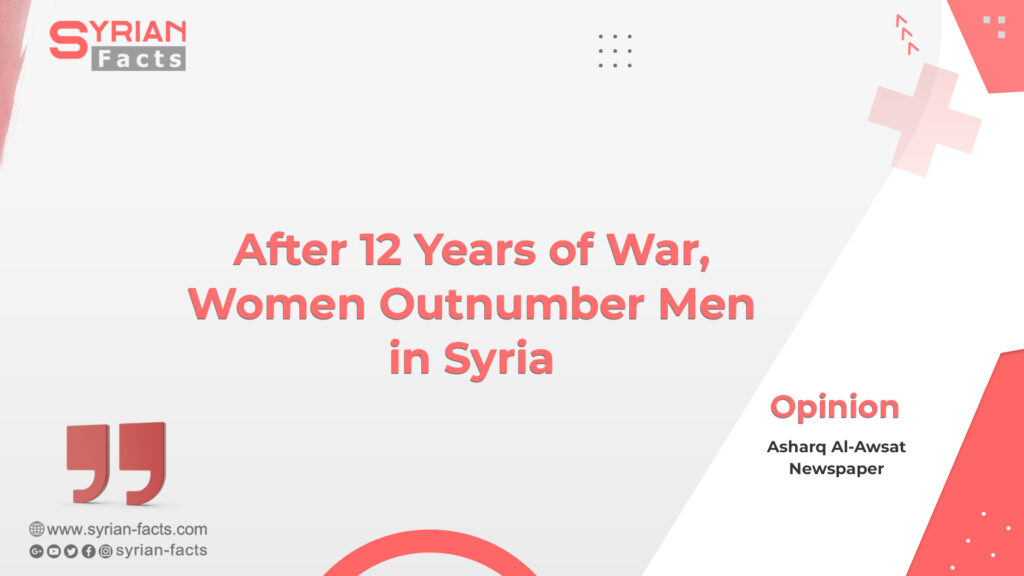A walk in the streets of Damascus is enough for a person to notice the predominance of women and absence of men in the war-torn country. Where have the men gone?
After 12 years of war tens of thousands of men joined the army and many others were killed or forced to flee the country, leaving behind the women, who now outnumber their male counterparts.
Syria has not held a census since 2004, but a 2023 study by the Jusoor for Studies center showed that Syria’s population stood at 26.7 million people, including over 9 million residing abroad.
A source at the Ministry of Social Affairs and Labor said women now make up 60 percent of the population.
Speaking to the Arab World Press (AWP) on condition of anonymity, the source added: “More women have joined the workforce so that life could go on in the country.”
Women outnumber men seven to one in the market, he revealed, predicting the figure will rise to ten to one in the future.
Unmarried women
The war has created countless problems in Syria, including a drop in marriages. Minister of Social Affairs and Labor Salwa Abdullah revealed in 2021 that less and less men have been marrying, raising the number of unmarried women to over 70 percent.
“Who will I marry?” wondered architect Susan, 33, who hails from a small town in the coastal Tartus province.
“There are no men left in our cities. The only men we see are the posters of martyrs whose images are plastered all over the walls. The only male voices we hear are the ones over the telephones of loved ones living abroad,” she added.
She said not a single women has a ring on her finger to signify an engagement or marriage. “Only a lucky few have nabbed a husband,” she remarked.
Moreover, she revealed a new trend in nearby villages where women are agreeing to become the second wife of already married men. She spoke of her shock when she learned that her friend agreed to marry a man 25 years her senior.
A judicial source told AWP that 40 percent of new marriage licenses in Damascus are actually applications for a second marriage.
Sociologist Nasry Kayali said one of the consequences of the war has been the rise in polygamy.
The war has led to a large discrepancy between men and women, so some women have reluctantly agreed to a polygamous marriage in spite of its downsides, he went on to say.
He warned that the imbalance between men and women will have economic and social repercussions in Syria and transform it from a young to an aging society.
Military service
Rayan, 28, a recent graduate in Damascus revealed that he didn’t earn enough grades that allow him to pursue higher studies, which would allow him to be temporarily exempt from mandatory military service.
“It is a disaster. I can no longer delay my enlistment,” he lamented.
“Life here isn’t fair. When you don’t have enough money to flee abroad, you are forced to join the army,” he added. “You are forced to put your dreams, plans and ambitions on hold.”
The Syrian constitution describes military service as a “sacred duty”. Once they turn 18, every able-bodied male has to enlist in the army for 18 months to two years of service. After they are discharged, they remain reservists for a period of around seven years.
However, the war led to amendments to the enlistment laws, making it so the reserve period could stretch beyond seven years, meaning any male could be called up for the military. This has forced several Syrians to flee abroad rather than join the army and its perils during war.
Rayan revealed that he will seek refuge in Lebanon to avoid military service. “I don’t want to leave my country, but I couldn’t find any other option,” he said, adding that once in Lebanon, he will seek passage to Türkiye.
Immigration
Abdullah, 40, is one of millions of Syrians who could no longer tolerate the crippling economic crisis and unemployment in their country. Immigration has become an “inescapable” option, he said.
Abdullah works as an accountant for an import and export company in Damascus. He said his salary isn’t enough to support him, his wife and two children for more than three days. He has so far been unsuccessful in finding a second job.
He revealed that the family needs at least 6 million Syrian pounds (roughly 430 dollars) to buy essentials each month. He said he was forced to sell some of his wife’s gold jewelry to make ends meet. “Now, we no longer have anything to sell,” he remarked.
His wife, Mariam, 35, said she is not opposed to her husband traveling abroad to earn a better living.
She stated that two of her work colleagues also have husbands who have sought opportunities abroad given the dire conditions in Syria.
She noted that the lowest salary her husband could earn abroad is much better than the meager wages in Syria, which she said barely cover transportation expenses.
The International Committee of the Red Cross (ICRC) has said the conflict in Syria has plunged nearly 90 percent of the population in poverty.





Be the first to write a comment.